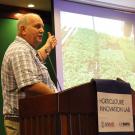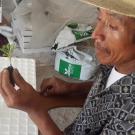Acute poverty and meager economic opportunities exist in many rural regions of Central America. Vegetable and seed production are technology-driven economic activities that can significantly contribute to economic growth in communities and families and specifically provide new opportunities that contribute to the economic empowerment of women. The factors limiting this horticultural transformation are access to:
- vegetable cultivars with resistance to endemic diseases,
- high quality seed of adapted cultivars,
- business know-how and basic management and marketing skills, and
- connections to regional supply chains that provide stable, predictable markets.
Cultivars developed by the World Vegetable Center have demonstrated tolerance to diseases endemic to Central America. Quality seed can be produced in the tropics in screen houses. The UW Center for International Business Education and Research (CIBER) is a small business incubator. Hortifruti is the dominant regional purchaser, distributor and marketer of vegetables. The supply chain benefits include:
- families and women’s groups develop technology-based seed and vegetable production businesses within each country,
- access to high quality seed of adapted cultivars reduces risk, minimizes losses and increases profitability in sustainable production for growers, cooperatives and women’s groups, and
- increased consumption of vegetables contributes to a healthier, more diverse diet.
This project has also been called "Semillas de Esperanza."
This project builds on a completed Immediate Impact Project.


